Testimonials: "Pot@maï", green, socially responsible energy in Republic of the Congo
Launched in 2019 on the initiative of “Pot@maï”, a French non-profit organisation specialising in renewable energies, with the support of the ENGIE Foundation, this programme will help to sustainably improve the living conditions of the 3,000 villagers living in Loubassa.’ It is a worthwhile project that once again fulfils the Foundation’s commitment to providing access to energy for all, and it could not be achieved without a green conscience. Testimonials!
A human adventure, a technological challenge
In a region where 90% of the rural population suffer from high levels of energy poverty, the Pot@maï association, supported by the ENGIE Foundation, is developing a unique programme granting access to green energy for the residents of Loubassa village, around 10 km from Brazzaville. The aim? To build and develop a floating tidal turbine capable of powering an “Essential Services Unit (ESU)” in Lyon, then to install it on the Congo River to supply power to almost 3,000 villagers, a first in Africa!
Commissioned in the coming weeks, the ESU will produce drinking water and electricity, store and process food products and power equipment for handicrafts, agriculture and livestock farming. A local company will then manage and maintain the site. Finally, the site will also be used to train and provide jobs for the region’s young craftspeople and farmers.
Testimonials
Françoise Matondo, resident of Loubassa
“It’s really difficult to buy petrol here, and there’s a shortage of drinking water. We have to cross the river to buy water in Brazzaville. Going back and forth each time, there are a lot of expenses. We are glad that the village is moving forward with this project. We will also be able to keep fish fresh and sell them locally. Here, there is no hospital. We would like to have a health centre. And instead of seeing young people just hanging around, we would like them to get professional training on the project site.”
Maguelonne Chevallier Loubelo, Chief Delegate of Pot@maï
“This project was born when I had the great privilege of visiting the Congo River and meeting its residents. Rubbing shoulders with them, talking to them and working together to build a lasting solution to the shortage of drinking water and fish preservation means. Working on this project presents technical, socio-economic, organisational and cultural challenges, which can sometimes seem insurmountable, but it is a unique experience. The desire to see the ESU in operation thanks to the Hydro-Gen tidal turbine – which owes its existence to the ingenuity and unerring motivation of David Adrian – and the curiosity of witnessing what users will make of it are the drivers of success! Many people have joined us in this adventure and I would like to thank them.”
FIND OUT MORE:
– Project file: “Green, socially responsible energy in Republic of the Congo, Pot@maï”
– Blog: “All aboard for green energy in Central Africa”
The story of Marie Perline, a beneficiary of the biogas programme in Madagascar
The story of Marie Perline, a beneficiary of the biogas programme in Madagascar
In 2018, the ENGIE Corporate Foundation joined forces with CODEGAZ, an internal NGO at the ENGIE Group, to support the development of biogas as the energy of the future and to improve the living conditions of Madagascan farmers. Thanks to this green energy, the local population saves money, earns additional income and contributes to the maintenance of the region’s biodiversity.
A green energy access project launched in 2018
A little more than a year ago, CODEGAZ was commissioned to build ten biogas digesters to provide energy for cooking, lighting and fertiliser for farmers in the Fianarantsoa region 400 km south of the capital. Biodigesters allow farmers in the region to use organic waste to produce biogas and digestate via methanisation.
Biogas, a source of green energy, allows these isolated populations to cook food and light their homes. As an alternative to wood for cooking, it limits deforestation and promotes biodiversity in the region. Digestate (a residual product of methanisation) is used as an agricultural fertiliser, especially in rice fields.
The installation of the digesters is accompanied by a training programme. The aim is to train Madagascan villagers in how to operate, run, maintain the digesters and use them for lighting and cooking with biogas. Farmers in the region then benefit from a sustainable source of energy and are self-sufficient by using it on a daily basis.
Marie Perline, a farmer, is one such beneficiary of the programme
Marie Perline lives in the bush village of Andohasamahamarina, 20 km south of Fianarantsoa, Madagascar’s second-biggest city. There is no road to reach the village, just a rudimentary track. Without access to electricity, like the vast majority of the local population, charcoal was used to prepare meals and kerosene lamps were used for lighting.
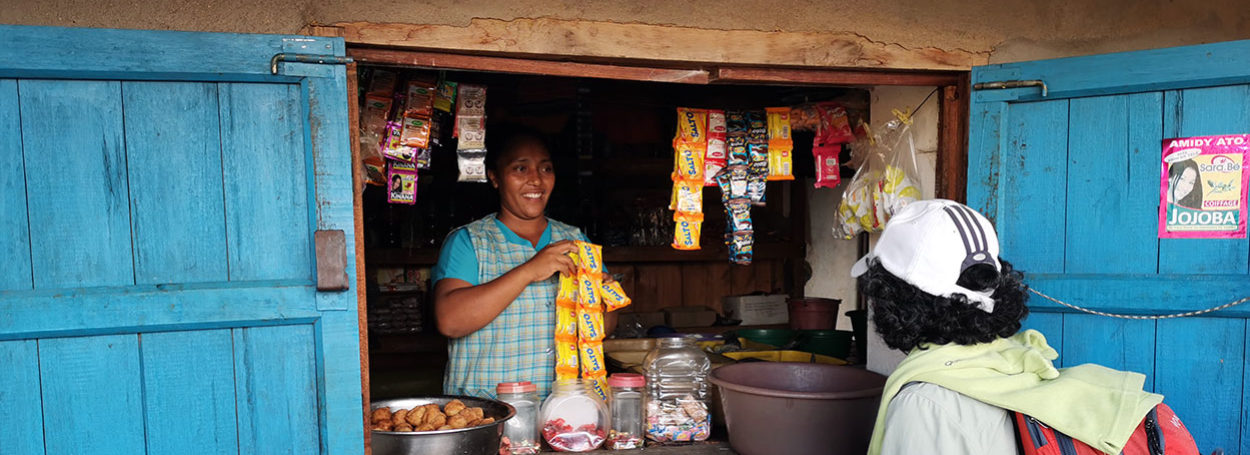
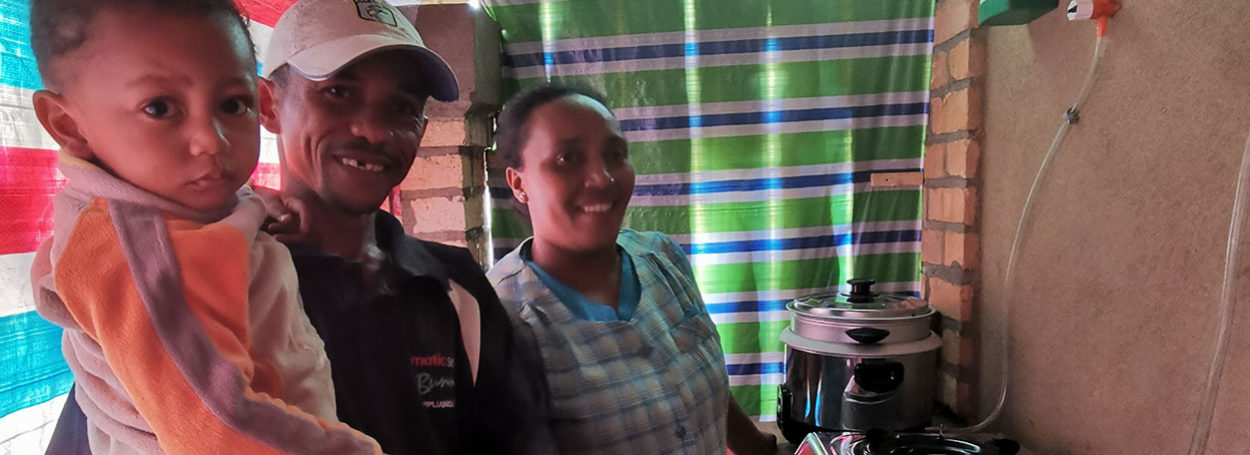
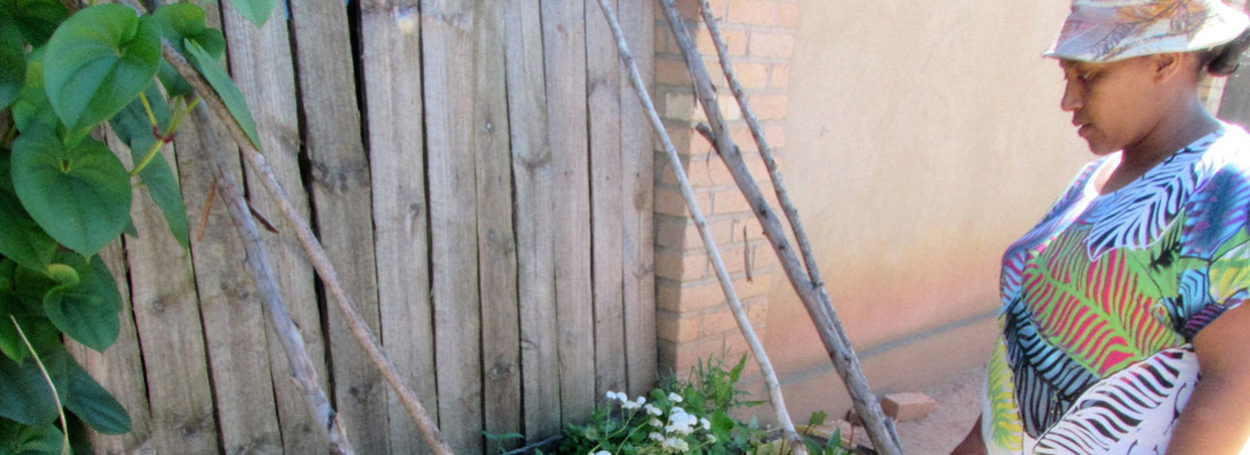
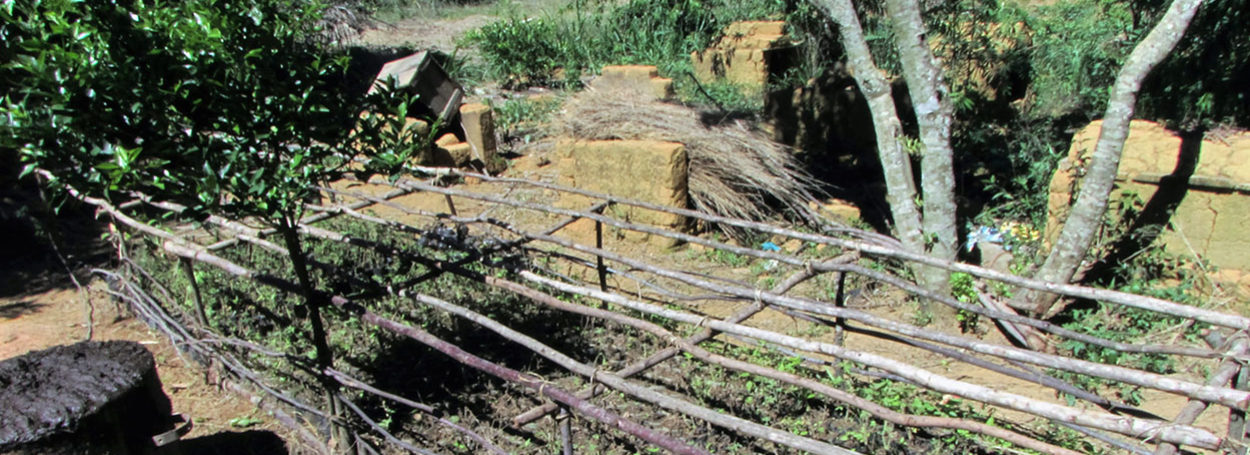
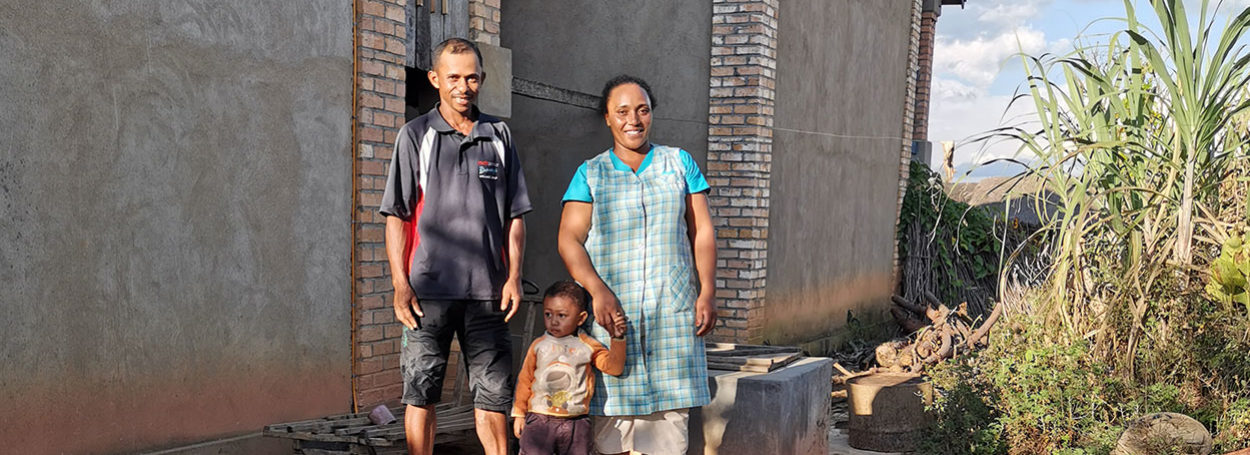
Marie Perline has been able to use a biodigester for a little over a year, thanks to CODEGAZ and the support of the ENGIE Foundation. This installation converts waste from her 3 dairy cows into biogas, which she uses for cooking and lighting, and into digestate that she uses as fertiliser for her crops. Her whole family has benefitted from the change.
Marie Perline has 4 children: “They used to do their homework around the kerosene lamp. They were all at the same table and their eyes were red the next morning. With the gas lamps, they can do their own thing. They’re more focused. And they’re eyes are better.”
The digester also helps her save money on purchases of charcoal (3 times less), oil (4 times less), fertiliser and pesticides. She also earns extra income in her shop, which can now stay open after dark, and from better harvests (tomatoes, fruits, herbs, etc.). She also saves more than 2 hours a day preparing meals thanks to a rice cooker, as rice is a staple of the Madagascan diet. Now she has more time to devote to her family, her pets and her small grocery shop.
This additional income helps with schooling for her three eldest children: the 7-year-old is in primary school, the 13-year-old is in secondary school and she was able to send her oldest, 17, to Hariniaina to study at university.
But Marie Perline does not intend to stop there! She is continuing to develop her work in arboriculture by planting orange trees that reforest the land and will eventually be a good source of additional income. She is also in the process of expanding her herb nursery to produce essential oils.
This is a great example of what biogas can do: it’s a green, renewable energy adapted to these isolated rural areas that also allows women to be more autonomous.
Third year of the Schools, Lights & Rights programme: half-way point
The Schools, Lights & Rights programme was created and financed by the ENGIE Foundation alongside the company’s long-standing partner, “La Voix De l’Enfant”. The association works in Afghanistan, South Africa, Burkina Faso, Cameroon, India, Morocco, Laos and the DRC. This is a quick update halfway through the project, 9 months after the launch of the third year of the programme.
Schools, Lights and Rights was launched during the COP 21 in South Africa in 2015 and currently has projects in 10 countries focused on two of the Foundation’s major commitments: energy access for all and social inclusion of young people and children. Volunteers work on the ground every day to improve the living conditions of children via three specific tasks: providing schools and other buildings that are used by children with electricity (with Energy Assistance France, the Engie Group’s internal NGO), handing out portable solar lamps and creating civil records.
The aim for the third year of the Schools, Lights and Rights programme is to ensure that actions undertaken since 2015 are there for the long-term and to increase the scope of the programme by getting local authorities involved to broaden access to education and digitise civil records. Volunteers are continuing to register details and raise awareness amongst local populations in often difficult conditions, particularly due to the social issues caused by the influx of refugees and irregular migrants. More than 161,000 additional civil records need to be recorded this year to reach 1 million registrations since 2015. Extending the programme in Laos is currently being studied.
In the “Lights” part of the programme, portable solar units are continuing to be handed out thanks to the support of local associations. In Madagascar, the units arrived just in time in Antananarivo to light up the start of the school year for children there. The children can use the portable solar units to do their homework in the evening, read and get home safely after school. In total, more than 21,000 units will be handed out this year.
New projects to provide electricity to schools and centres of education in isolated areas have been added to the programme this year . Two or three projects will see the light of day this year thanks to the ongoing commitment of the volunteers from Energy Assistance France, the Group’s internal NGO. Electricity access in remote villages improves learning conditions for children and creates a proper space for discussion and fun for all of the residents of the village. New requests for involvement in the programme in Africa and Asia are currently being studied.
All aboard for green energy in Central Africa!
This Tuesday saw a glimpse into the future for the villagers of Loubassa in the Republic of Congo. After months of studies and development, the floating tidal turbine that will power an “essential services unit” (ESU) on the Congo River in the coming months is undergoing testing on the Rhône in Lyon. This represents an unprecedented programme in enabling everyone to access green energy, which will improve the local residents’ living conditions in a sustainable manner.
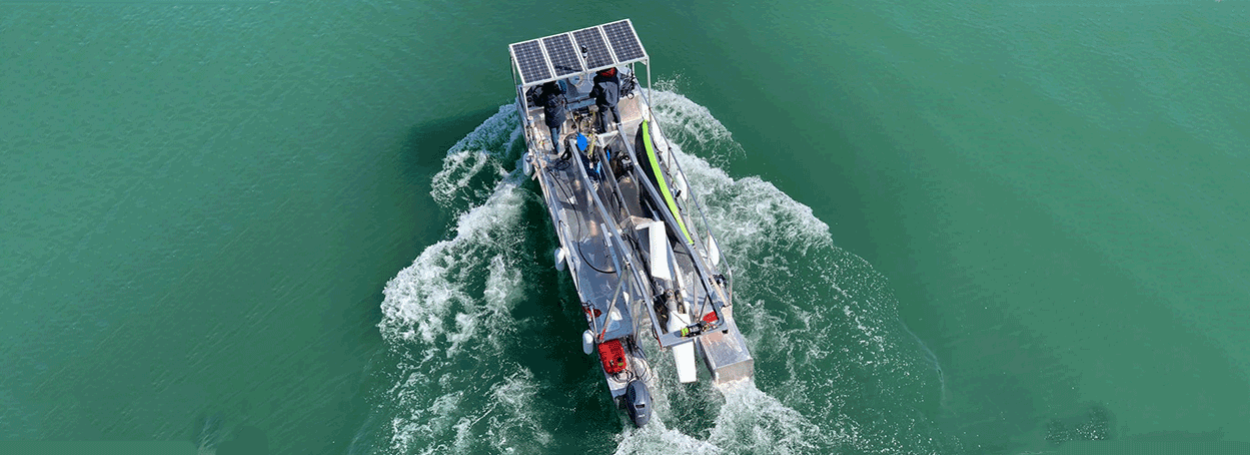
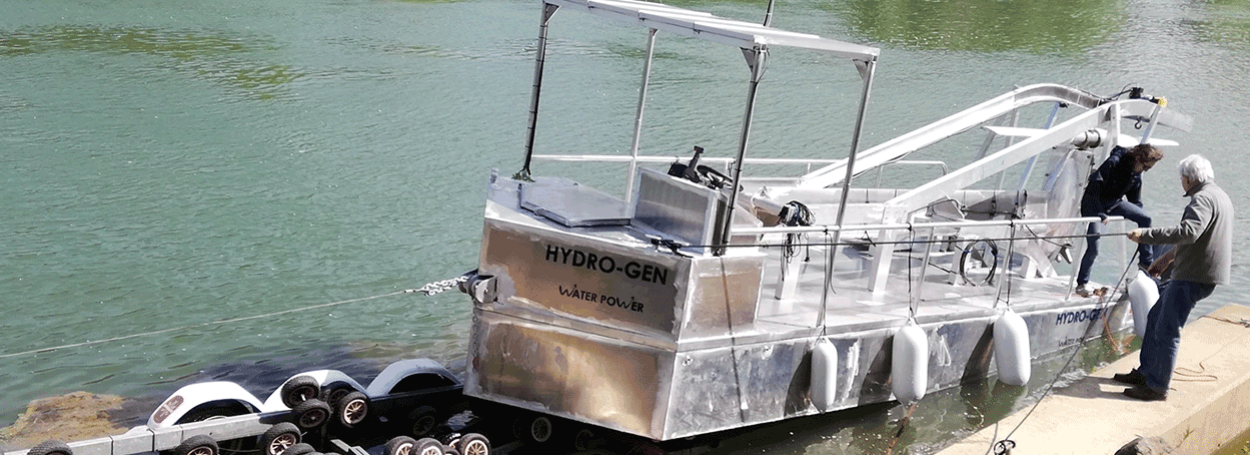
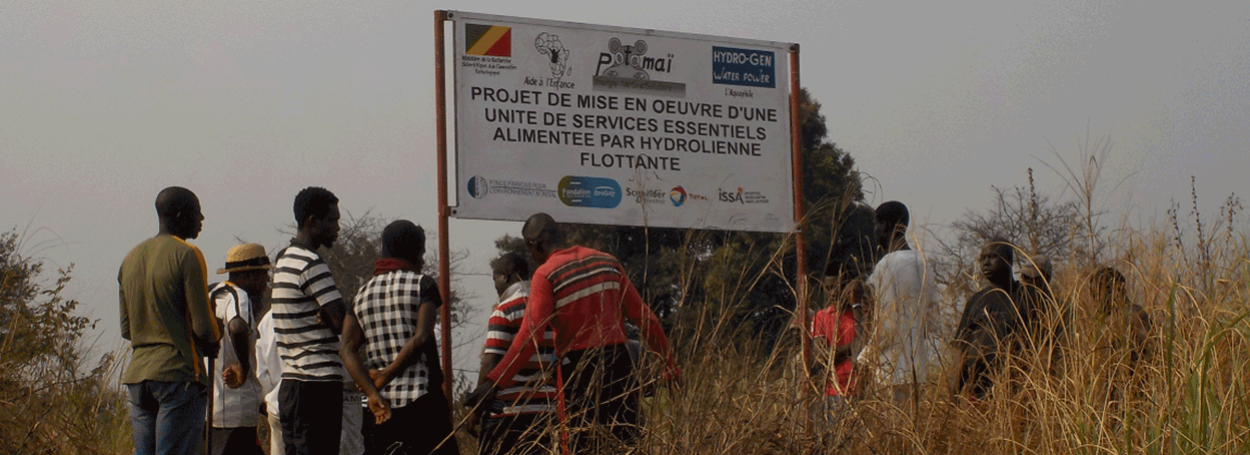
A local and sustainable solution
Rural areas in Sub-Saharan Africa have one of the lowest electrification levels in the world (12%). The lack of a secure source of power throughout the country is preventing the fundamental development of agriculture and forcing the local population to live off imported products up to 75% of the time. However, this is one great paradox, as we know this region boasts significant natural resources (soil, sun and water), with the Congo River and its tributaries in particular being able to provide enough to meet the local populations’ needs both in terms of electricity and drinking water.
It is in this light that a Franco-Congolese consortium consisting of Pot@maï, a French non-profit organisation specialising in renewable energies, L’Aquaphile, a French supplier of floating tidal turbines and Aide à l’Enfance, a Congolese non-profit organisation, decided to install a floating tidal turbine on the Congo River and an essential services unit in the village of Loubassa.
This project will improve the local populations’ living conditions in a sustainable manner and create economic activity in the landlocked villages close to the rivers: drinking water, cold storage, battery charging, communications, transformation of agriculture and fishing products, and machines and tools for craftspeople. Capable of generating and using energy around the clock, the ESU will supply almost 3,000 inhabitants of two villages with local, green energy. This site will also be used to train and provide jobs for young craftspeople and farmers.
It is a worthwhile project that once again fulfils the Foundation’s commitment to offering access to energy for all, and it could not be achieved without a green conscience.
SCHOOLS, LIGHTS AND RIGHTS : because every child have the right to education & energy
SCHOOLS : WHEN LIGHT COMES TO SCHOOL
The “Schools” part of the program has electrified six schools or drop-in centers in rural villages in Africa, Asia or Madagascar. The solar panels installed on the roofs of the schools by the volunteers of Energy Assistance France, an internal NGO of the ENGIE Group, bring not only the light but they also allow to innovate and to enrich the educational courses: digital rooms equipped with computers were created in Afghanistan, in partnership with the association Afghanistan Libre, to train girls to digital code and jobs.
– 6 electrified schools
– More than 3,000 beneficiaries
– 5 digital rooms created in Afghanistan, benefiting to 630 girls trained to digital jobs
LIGHTS: TO STUDY AT NIGHTFALL
Thanks to the “Lights” component, nearly thirty-five thousand pocket solar lamps have been distributed to schoolchildren, especially in rural villages that are not connected to the electricity grid. The solar-charged lamps have a battery life of more than thirty hours and allow children to return from school at dusk and do their homework at home.The use of lamps also makes communities and families aware of the benefits of renewable energies.
– 34,700 solar lights distributed
– 30 hours of battery life, with a light charge indicator and an SOS Flash mode
RIGHTS: GIVE BACK THEIR RIGHTS TO GHOST CHILDREN
In the world, one in seven people does not have a civil status. In Africa, according to the UNICEF, nearly 50% of the population is not registered. For “ghost children” without identity they simply do not have access to school or health and later, to employment. This is why the rights section of the program is a priority. On the spot, the partner associations of La Voix De l’Enfant are mobilizing to give ghost children an identity and convince parents to enroll their children in school. The most spectacular action has been taken in DRC (Democratic Republic of the Congo), but many children have received the sesame in other countries where the program is located, including South Africa, Madagascar and Afghanistan.
– 1 million civil status distributed in the DRC
– 3,000 “Tazkira” (IDs) distributed to Afghan girls
– 2,000 young South Africans received their papers in Gauten Province
A SYNERGY WITH THE ENGIE FOUNDATION PARTNERS
Three associations already partners of the ENGIE Foundation are mobilized to deploy the Schools, Lights and Rights program on the spot: Afghanistan Libre, Valued Citizens Initiative (South Africa), Sourires d’Enfants (Laos).
The Foundation participates in the electrification of two secondary schools in Ethiopia
Energy Assistance volunteers brought their expertise to the local population in a rural area of the Woreda (district) of Mirab Abaya, more than 100 km from the national power grid.
The project ?To take advantage of the excellent solar radiation available all year round in the region, to provide electricity to two high schools using solar photovoltaic technology. In total, 11 buildings and 34 classrooms have benefited from clean and sustainable electricity since the beginning of the year. This programme enabled the 800 schoolchildren who benefited from it to return to the national education programme thanks to computers and video recorders that were also powered by solar panels.
These two projects, partly funded by the ENGIE Foundation, were carried out in collaboration with Arba Minch University, which helped to transport Arba Minch’s equipment to the sites and provided a technician to assist with installation and ensure the project’s sustainability over time.
An association of ENGIE Group employees
Created in Belgium by active and retired ENGIE employees, Energy Assistance brings together volunteers from the Group’s energy business sectors and power grid distributors. Target To use the skills and expertise of its members, supported by ENGIE’s technical resources, to assist humanitarian projects aimed at populations that do not have access to essential energy services, on all continents.
They offer their expertise for:
– decentralised energy production to supply clinics, schools, orphanages with renewable energy;
– the construction and connection of mini grids to supply electricity to remote communities ;
– the rehabilitation of electrical facilities.
Energy Assistance projects mostly use photovoltaic solar energy, but experts also use hydropower or wind power when conditions and geography make it possible. The association is committed to a long-term partnership with local beneficiaries in order to ensure the sustainability of its achievements (training).
KNOW MORE :
– Project description
– The website of Energy Assistance asbl
2019-2020: 3rd phase of the Schools, Lights and Rights program
The ENGIE Foundation, which initiated the innovative and transversal “Schools, Lights and Rights” program with its historical partner La Voix De l’Enfant, decided to continue and develop it in a third phase in 2019-2020.
So, these are:
– More than 21,000 additional portable solar lamps to be distributed in 9 countries: Afghanistan, South Africa, Burkina Faso, Cameroon, India, Madagascar, Morocco, Democratic Republic of Congo and Laos. These solar lights will allow children to do their homework at night, read and be safe on their way home from school. These solar lights will be donated to local schools and associations to distribute to children and ensure their proper use. Renewable energy and environmental awareness will also be provided to these children, as well as to local populations.
– More than 161,000 additional civil status records should be completed. Since the introduction of this program in 2015, we count the establishment of more than 1 million civil states for children attending these schools: registration of children in civil status and awareness activities with families and local authorities.
– 2 to 3 schools and additional reception facilities should be electrified in collaboration with Energy Assistance France, an NGO within the ENGIE Group (symbol of the voluntary commitment of employees who put their skills at the service of humanitarian projects).
This program combines access to energy, education and civil rights. It is why it is innovative and its digitization for the registration of the civil states will make it exponential.
Because the world of tomorrow cannot be conceived without light, because energy is a condition for access to education, health, economic activity, and well-being, because the establishment of civil states allows every child to be protected and to have access to his rights, the ENGIE Foundation continues the deployment of this flagship program!
“These little lamps do not look like anything, but they change the life” (Martine BROUSSE – President of La Voix De l’Enfant).
Update on the solar panel project at the PSE school in Cambodia
Last June, the NGO Pour un Sourire d’Enfant (For a Child’s Smile, PSE) installed a photovoltaic generator at its school in Phnom Penh, Cambodia. The aim? To allow the 2,200 children to study in better conditions and improve their knowledge of their environment. Four months after it began operating, we take a look out how the project is doing.
An ambitious project, part of a wider sustainability approach
The project has been a great success. The photovoltaic generator provides enough power to meet the school’s day-to-day needs and the NGO’s teams use modern technology to monitor the system’s performance in real time.
The installation demonstrates PSE’s commitment to sustainable development. The NGO has incorporated awareness of renewable energy and biodiversity into its educational approach. In all, around 2,200 youngsters and 650 adults have learnt about the sustainability approach through events such as Two Weeks for the Environment, Passion for Saving the Environment, talks, activities and training modules on environmental issues.
With the support of the ENGIE Foundation, the NGO has also acquired equipment such as batteries and inverters, which are used in students’ practical training at the PSE School of Building Trades. Among other things, they learn how solar panels work and how to install and maintain them.
Video produced by the PSE Institute’s School of Media in Phnom Penh.
Find out more
• A photovoltaic generator for the For a Child’s Smile school in Phnom Penh
The "visual language" created, used and interpreted by and for the global refugee population
Created by Bryan Mc Cormack in September 2016, Yesterday Today Tomorrow (YTT) started out as a conceptual art project with the intention of giving the refu- gee population their own singular, common voice by creating a visual language that can be communicated by every man, woman and child, independently of nationality, education, language or dialect spoken.
So far, Yesterday Today Tomorrow has visited and worked in 27 camps and squats in 8 countries across Europe, collaborating with seve- ral hundred refugees. Each refugee receives 3 sheets of paper and colored pens and is invited to draw 3 sketches: One of their life before: Yesterday. One of their current life: Today. And one of their life imagi- ned in the future: Tomorrow.
However, as Yesterday Today Tomorrow has developed, so too has it’s objectives. What was once a conceptual art project has now become a fully-fledged International Project with very specific goals that are broken-down into 3 main categories.
The creation of educational/ pedagogical tools
Since the beginning, YTT has collaborated with Sheffield Hallam University to develop series of masterclasses, research modules and workshops with the performance students of the university. The objective is to create a pedagogical tool (a schools workshop protocol) by combining refugee drawings and performance techniques to educate students on the refugee crisis through the exploration and embodiment of the refugee drawings collected as part of YTT.
YTT has also started to collaborate with the Department of Education at Roma University with special expertise in Child Development, Cognitive Development, Developmental Psychopathology and Nonver- bal Communication to create an educational program for primary-school pupils and the training on that program for the pre-service teachers.
The creation of psychosocial programs and clinical assessment tools
YTT will begin the research on clinical assessment tools, protocols and psychosocial programs that can be used, through the YTT drawing workshops and it’s digital database, by volunteers in refugee camps and conflict zones around the world. With the aim to help refugees cope better with war and displacement and signal mental health complications for which refugees, and above all children, are at an extremely high risk of suffering from. And/or as a “first-contact/ presentational tool” for refugee comprehension suitable and adaptable to most refugee initiatives around the world. This research will involve further collaboration with universities, academic and specialized institutions and also broaden-out to psychological and linguistic development research. As well as involving future educators with training on the use of YTT as a tool to create emotional and comprehensible contact with refugees/migrant population and as a visual language “platform” to share their experiences.
The artistic interpretation of this visual language
The people who should visualize and give voice to this humanitarian disaster are the refugees themselves. YTT maps out, as a cultural and visual memory, the global exodus of people. Moreover, by participating in the creation of these drawings, the refugees are leaving their own trace, creating their own contemporary culture and voice whilst simul- taneously losing all traceability of their inherited culture. Traceability is credibility, without it, the existence of a people disappears. Each refugee drawing counts. Each refugee drawing is a voice. Every voice counts.
A photovoltaic generator for the For a Child's Smile School (PSE) in Phnom Penh
For 20 years, the Cambodian association Pour Un Sourire d’Enfant (PSE), meaning For a Child’s Smile, has been striving to get children out of extreme poverty. In 2017, PSE built a School of Sales Management (EGV) in Phnom Penh. A few weeks ago, the association inaugurated a photovoltaic generator in the school grounds, allowing 2,200 children to study in better conditions and improve their knowledge of their environment.
 Energy savings and environmental awareness
Energy savings and environmental awareness
The photovoltaic generator on the new campus of the School of Management and Sales run by the NGO For a Child’s Smile (PSE) has just been installed. Thanks to the solar energy generated by the new system, PSE envisages saving around $12,000 a year on the energy bill of its centre in Phnom Penh (Cambodia). Every day, nearly 2,200 children and young people living in extreme poverty come to study at the centre, the remedial school or the association’s Professional Training Institute (FPA), where 450 young students live as boarders.
In addition to the savings it enables the NGO to make, the installation of the solar generator helps to heighten the awareness of the young Cambodians supported by PES of renewable energy and biodiversity. The association has integrated such awareness-raising into its educational approach. With the generator commissioned this month, PSE invited all the centre’s children to take part in the second edition of its World Environment Day, organised on 5 June, which was followed up by a fortnight focusing on the environment, comprising courses, conferences and activities organised for all the children.
Learn more by clicking here!

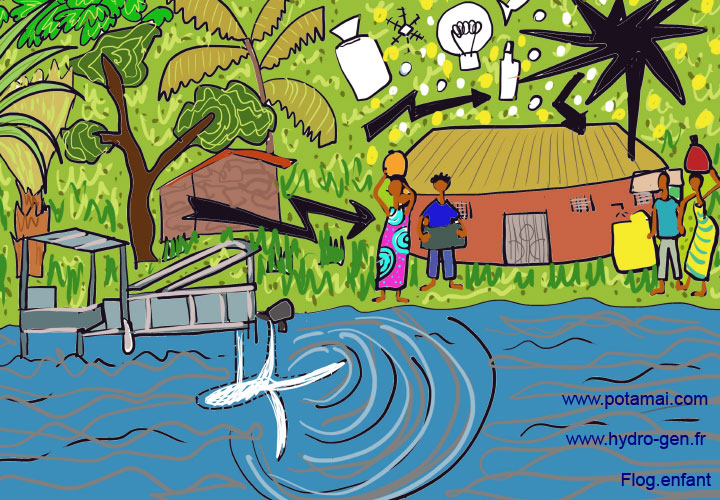
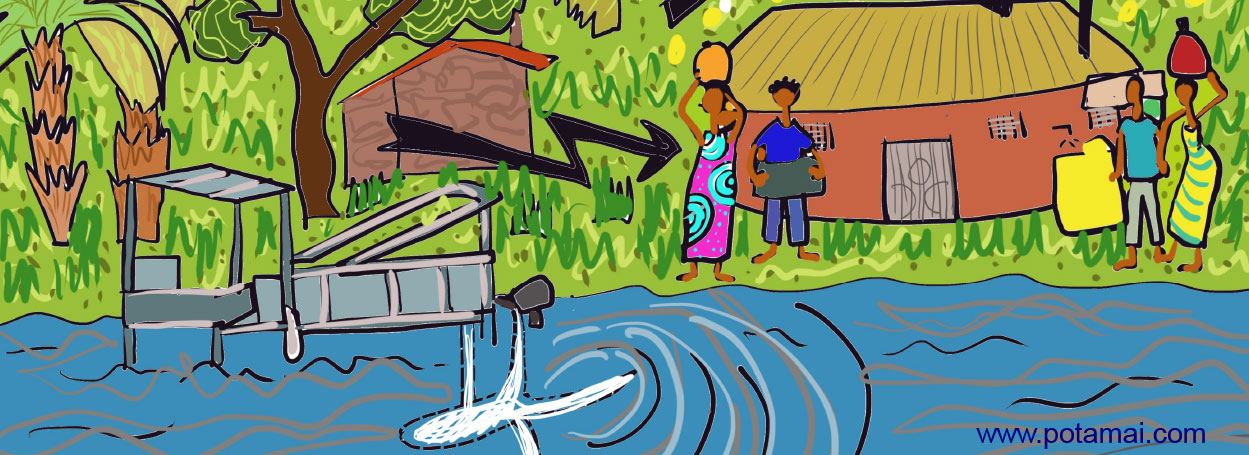
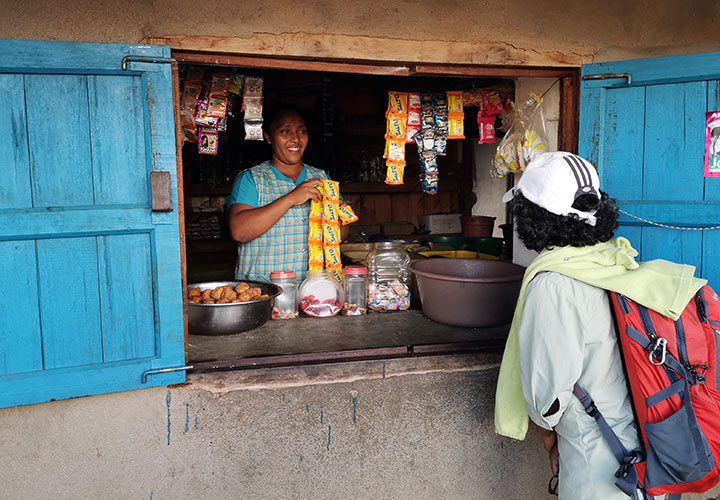
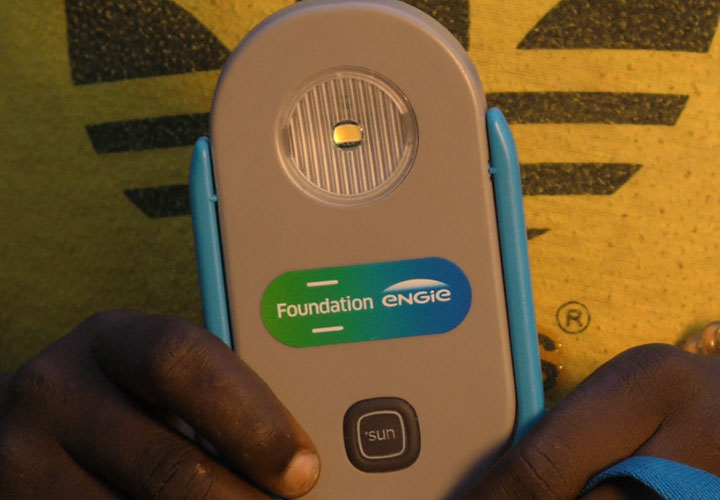
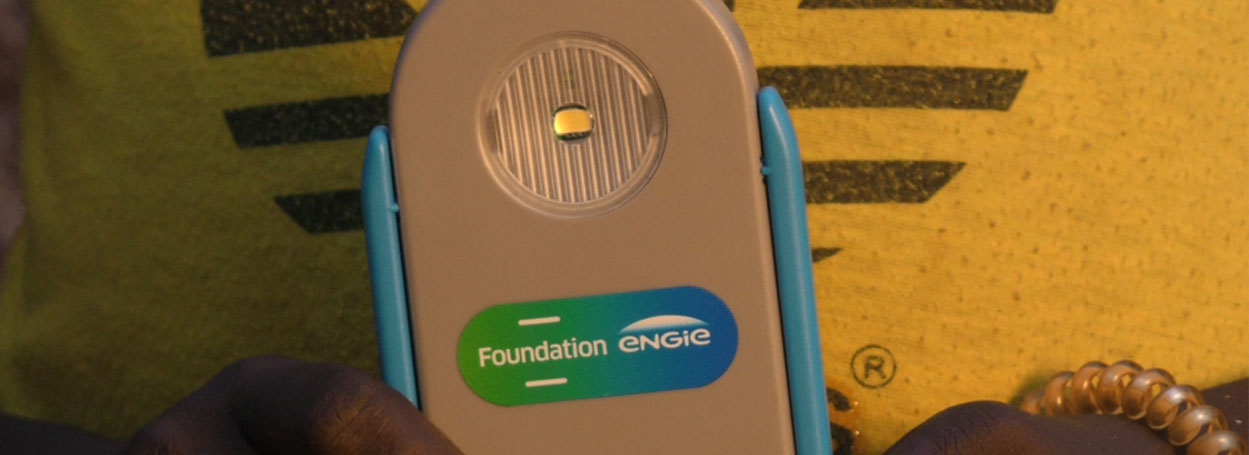

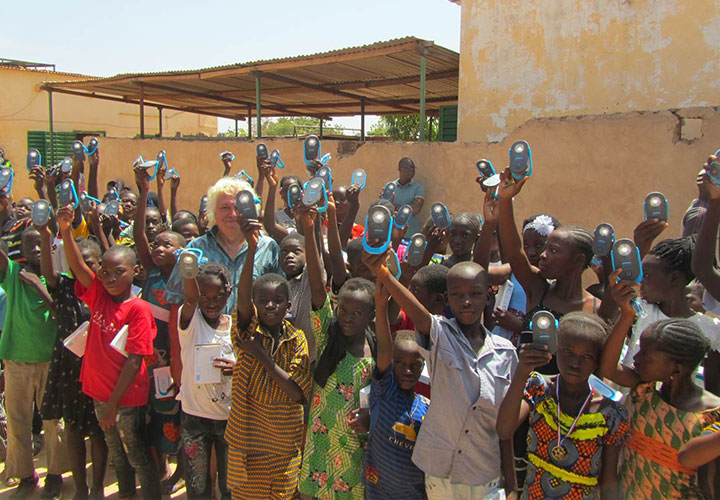
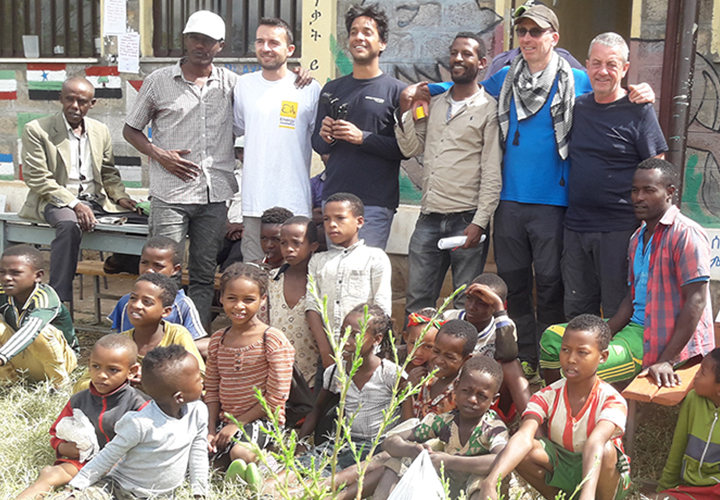
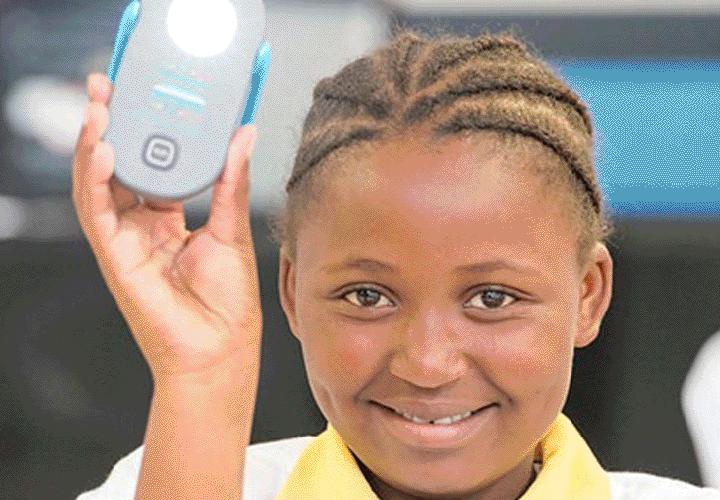



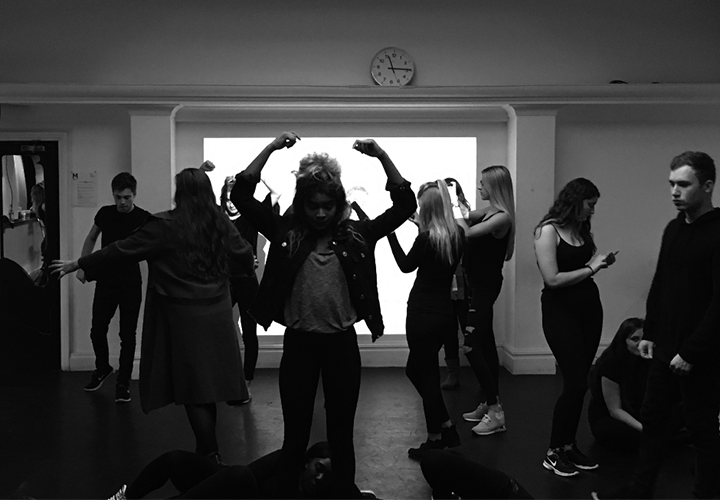

 Energy savings and environmental awareness
Energy savings and environmental awareness